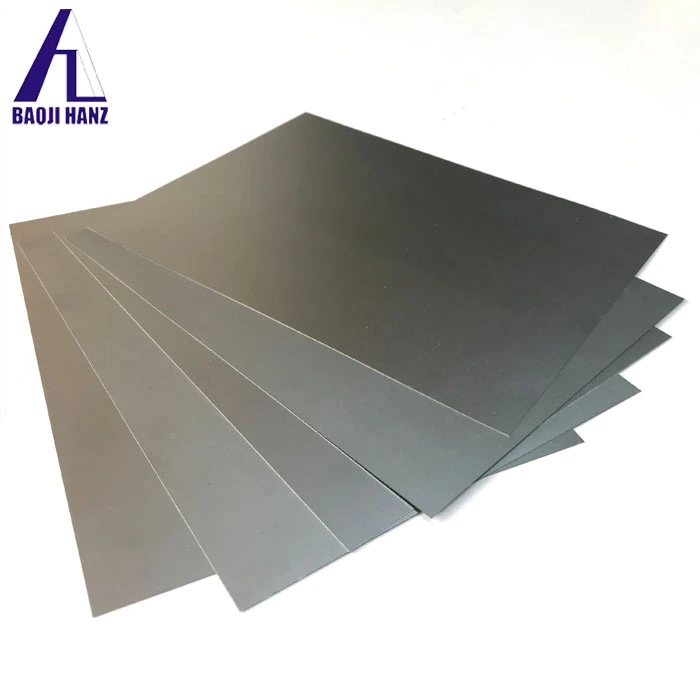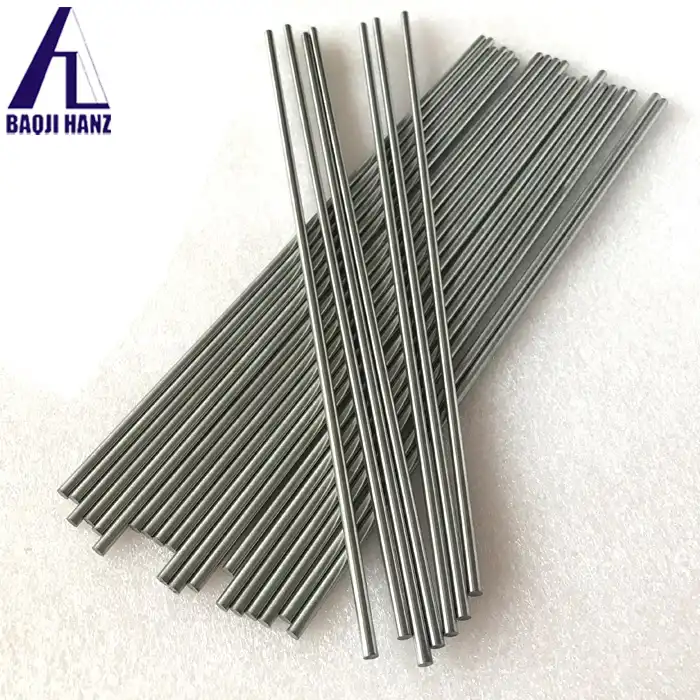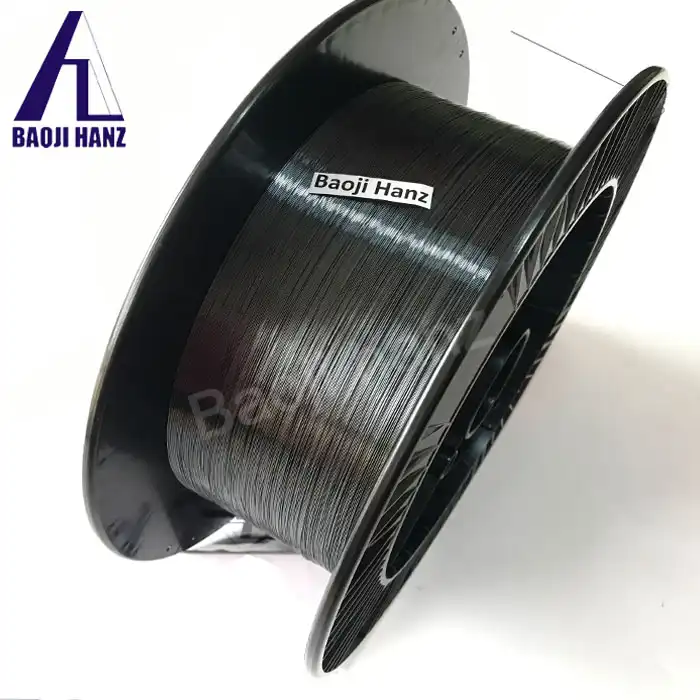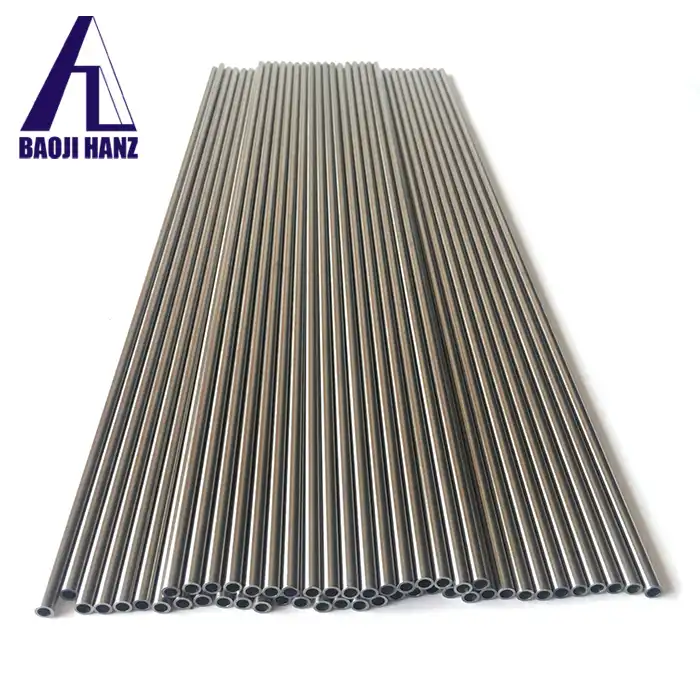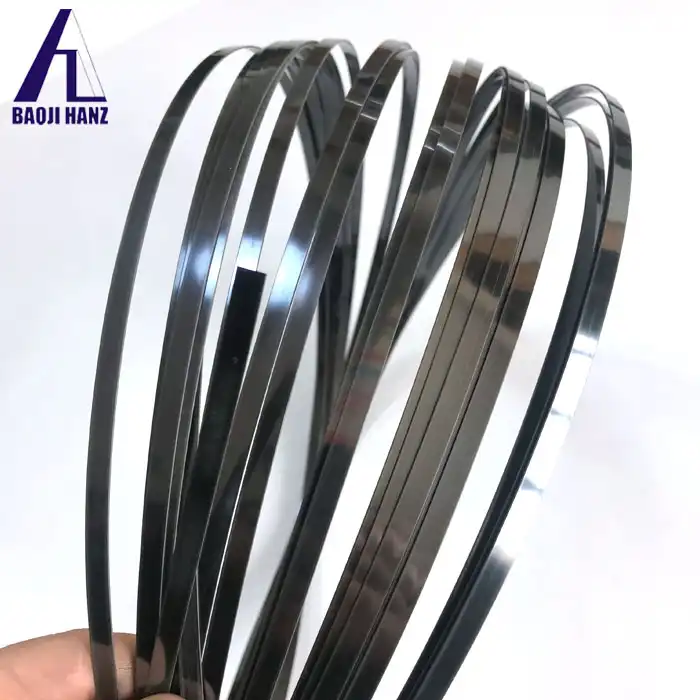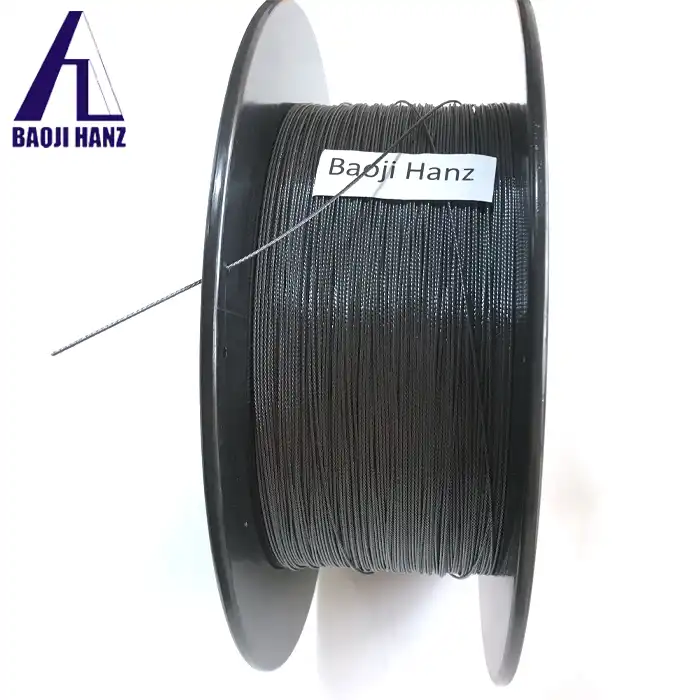How are NiTi-01 Memory Nickel Titanium Gaskets manufactured?
2025-05-13 15:44:57
The manufacturing process of NiTi-01 Memory Nickel Titanium Gaskets represents a sophisticated blend of metallurgical expertise and precision engineering. These specialized gaskets, produced using advanced nitinol alloys, undergo multiple critical production stages to ensure their remarkable shape memory properties and superelasticity. The manufacturing begins with carefully selected high-purity nickel and titanium raw materials that are precisely measured and combined. The NiTi-01 Memory Nickel Titanium Gasket production process incorporates vacuum melting, precision casting, thermal processing, and finishing operations that collectively result in gaskets with exceptional performance characteristics suitable for demanding applications across aerospace, medical, and industrial sectors.

Raw Material Processing and Alloy Formation
Selection of Premium-Grade Materials
The manufacturing of NiTi-01 Memory Nickel Titanium Gaskets begins with the careful selection of raw materials. At Baoji Hanz Metal Material Co., Ltd., we utilize only the highest grade nickel and titanium to ensure optimal performance in our final products. With a nickel content of approximately 55%, our material composition is precisely controlled to achieve the desired properties. The purity of these materials directly influences the performance characteristics of the finished NiTi-01 Memory Nickel Titanium Gasket. Our sourcing protocols ensure that only materials meeting stringent quality standards enter our production stream. The raw materials undergo rigorous testing for chemical composition, purity levels, and structural integrity before moving to the alloying phase. This meticulous approach to material selection forms the foundation for creating gaskets with a density of 6.45g/cm³ and the capability to perform reliably in applications ranging from electrical systems to medical devices, where consistency and reliability are paramount.
Vacuum Melting and Homogenization
Once the premium raw materials are selected, they undergo vacuum melting in our state-of-the-art facilities. This critical step in manufacturing NiTi-01 Memory Nickel Titanium Gaskets involves precise temperature control and specialized equipment to ensure proper alloying without contamination. The vacuum environment prevents oxidation and the introduction of impurities that could compromise the material's integrity and performance characteristics. During this process, nickel and titanium are combined according to our proprietary formulation that yields the optimal balance of shape memory properties and superelasticity. The molten alloy undergoes homogenization to ensure uniform distribution of elements throughout the material matrix. This uniformity is essential for consistent performance of the NiTi-01 Memory Nickel Titanium Gasket across various temperature ranges, particularly within its functional range of -20°C to 100°C (AF temperature). The homogenization process involves controlled cooling rates and specific thermal profiles that are monitored by our expert metallurgists to achieve the precise microstructure required for shape memory applications.
Initial Casting and Formation
Following vacuum melting and homogenization, the NiTi-01 Memory Nickel Titanium Gasket material undergoes initial casting into ingots or billets. This stage requires precise temperature control to ensure proper solidification without introducing defects or internal stresses that could affect performance. Our advanced casting technologies allow for the creation of material with consistent composition throughout, which is essential for predictable behavior in the finished gaskets. The cast material serves as the foundation for subsequent processing steps. The initial formation establishes the fundamental structure that will later be refined through additional manufacturing processes. Our ISO9001:2015 and ISO13485:2016 certified manufacturing processes ensure that each cast meets strict quality standards before proceeding to the next production phase. These ingots or billets contain the basic alloy structure that will eventually display the remarkable properties characteristic of our NiTi-01 Memory Nickel Titanium Gaskets, including their ability to return to predetermined shapes when subjected to specific thermal conditions.
Precision Shaping and Processing
Rolling and Sheet Formation
The transformation of cast NiTi-01 alloy into usable sheet material involves sophisticated rolling processes that carefully reduce thickness while maintaining material integrity. This critical manufacturing stage determines many key properties of the final NiTi-01 Memory Nickel Titanium Gasket. Our precision rolling equipment can produce sheets ranging from ultrathin 0.1 mm up to robust 5 mm thicknesses, accommodating diverse application requirements. During rolling, the material undergoes work hardening, which must be carefully controlled to preserve the alloy's memory characteristics. The rolling process also aligns the crystalline structure of the material in ways that enhance its performance properties. Throughout this process, material parameters are continuously monitored to ensure consistent quality. The resulting NiTi-01 Memory Nickel Titanium Gasket sheets exhibit remarkable superelasticity, allowing them to return to their original dimensions after being subjected to significant deformation—a property that makes them invaluable in applications requiring reliable sealing under variable conditions. This stage represents a significant technical achievement in the manufacturing process, as the nitinol alloy is notoriously difficult to work with due to its hardness and specific metallurgical requirements.
Precision Cutting and Shaping
Once the sheet material reaches the desired thickness, it undergoes precision cutting to form the NiTi-01 Memory Nickel Titanium Gasket into specific shapes—most commonly circular configurations as indicated in our product specifications. This process employs advanced cutting technologies including laser cutting, water jet cutting, or precision die-cutting depending on the specific requirements of the gasket being produced. Each method offers different advantages in terms of edge quality, dimensional accuracy, and material performance preservation. The cutting process must be carefully controlled to avoid creating micro-defects or altering the material's memory properties through excessive heat or stress. For customized orders, we calibrate our cutting parameters to achieve exact customer specifications. The NiTi-01 Memory Nickel Titanium Gaskets are generally produced in circular form but can be customized to other geometries as needed for specific applications. Our cutting processes maintain tight tolerances, typically within 0.02mm, ensuring that each gasket will perform consistently when installed. This precision is particularly important in applications where exact fit is critical to system performance, such as in medical devices or aerospace components where our gaskets have gained significant adoption.
Surface Treatment and Finishing
The final phase in the physical shaping of NiTi-01 Memory Nickel Titanium Gaskets involves surface treatment and finishing operations that enhance both functionality and appearance. Our standard finishing includes mechanical polishing as specified in our product documentation, which creates a smooth surface with optimal friction characteristics. This polishing process removes any microscopic irregularities that might compromise sealing efficiency or create wear points during operation. Beyond mechanical polishing, additional surface treatments may be applied depending on the intended application of the NiTi-01 Memory Nickel Titanium Gasket. These can include passivation treatments to enhance corrosion resistance, especially important for gaskets used in corrosive environments or medical applications where biocompatibility is essential. Surface finishing not only improves performance but also extends the operational life of the gasket by minimizing potential points of failure. The finished NiTi-01 Memory Nickel Titanium Gaskets display a characteristic luster and smooth surface that facilitates installation and ensures proper function. These finishing processes are performed in accordance with our ISO certification standards, ensuring consistent quality that meets international requirements. The final product combines aesthetic appeal with the functional excellence that has made our brand, identified by the TiNi-02 brand number, recognized throughout the industry.
Heat Treatment and Memory Imprinting
Shape Memory Training Process
A defining characteristic of the NiTi-01 Memory Nickel Titanium Gasket is its ability to "remember" and return to a predetermined shape—a property that requires specialized heat treatment processes to imprint. This shape memory training represents perhaps the most technically sophisticated aspect of the manufacturing process. During this critical phase, the gaskets are fixed in their desired final shape and subjected to carefully controlled heating cycles typically between 450-550°C for specific durations. These precise thermal profiles create the molecular arrangement that enables the material's remarkable memory effect. The NiTi-01 Memory Nickel Titanium Gasket undergoes a crystalline phase transformation during this process, establishing the shape it will return to when heated above its transformation temperature. Our engineers carefully monitor and adjust the parameters of this process based on material thickness, specific alloy composition, and intended application requirements. The sophistication of our heat treatment facilities allows us to customize the activation temperature range from -20°C to 100°C (AF temperature), making these gaskets suitable for various operating environments. This customization capability represents a significant advantage of working with Baoji Hanz Metal Material Co., Ltd., as we can tailor the memory characteristics to meet specific application needs rather than forcing customers to adapt to standard products.
Thermal Cycling and Stabilization
Following the initial shape memory training, NiTi-01 Memory Nickel Titanium Gaskets undergo thermal cycling and stabilization treatments to ensure consistent performance throughout their service life. This process involves repeatedly cycling the material through its transformation temperature range, which strengthens the memory effect and stabilizes the material's behavior. Without this crucial step, the NiTi-01 Memory Nickel Titanium Gasket might exhibit diminishing memory effects over time or inconsistent performance. Our thermal cycling processes typically involve between 20-100 cycles depending on application requirements, with each cycle carefully controlled to optimize material properties. The thermal stabilization ensures that when deployed in the field, the gaskets will perform predictably even after multiple activation cycles. This reliability is particularly valuable in applications where maintenance access is limited or where failure could have significant consequences. Throughout this process, samples are regularly tested to verify that the NiTi-01 Memory Nickel Titanium Gasket maintains its specified performance characteristics, including activation temperature, force generation, and recovery rate. The stabilization process also helps to relieve any internal stresses that might have been introduced during earlier manufacturing stages, resulting in a product with optimal performance characteristics and extended service life.
Quality Control and Performance Testing
Every batch of NiTi-01 Memory Nickel Titanium Gaskets undergoes comprehensive quality control and performance testing before being approved for shipment. Our testing protocols evaluate multiple parameters critical to gasket function, including transformation temperatures, shape recovery rates, generated forces, fatigue resistance, and dimensional accuracy. Specialized differential scanning calorimetry (DSC) equipment measures the precise transformation temperatures, ensuring they fall within the specified range for each product variant. Mechanical testing evaluates the superelasticity properties of the NiTi-01 Memory Nickel Titanium Gasket, confirming its ability to recover from deformation of up to 8% without permanent damage—far exceeding what conventional materials can achieve. Corrosion resistance testing simulates the environmental conditions the gaskets will face in service, particularly important for applications in medical devices where our ISO13485:2016 certification demonstrates our commitment to the highest standards. Our EU CE certification further validates the quality and safety of our products for European markets. Each NiTi-01 Memory Nickel Titanium Gasket is inspected for dimensional accuracy using precision measurement equipment, ensuring that even with our minimum order quantity (MOQ) of just 10 pieces, customers receive consistently high-quality products. This comprehensive testing regime ensures that every gasket shipped meets the exacting standards that have established our reputation as a leading manufacturer in this specialized field.
Conclusion
The manufacturing of NiTi-01 Memory Nickel Titanium Gaskets involves sophisticated metallurgical processes combining precise alloy formulation, controlled thermal treatments, and meticulous quality control. From raw material selection through shape memory training, each step is optimized to produce gaskets with exceptional performance characteristics including superelasticity, corrosion resistance, and reliable shape memory effect.
Looking for premium NiTi-01 Memory Nickel Titanium Gaskets for your next project? With 7 years of expertise in Nitinol Shape Memory Alloy production, Baoji Hanz Metal Material Co., Ltd. offers unmatched quality, cost advantages through direct supply, and rapid delivery from our extensive inventory. Our customized OEM services can adapt to your specific requirements, whether you need special dimensions, unique alloy compositions, or custom packaging solutions. Contact us today at baojihanz-niti@hanztech.cn to discover how our advanced gasket solutions can enhance your applications!
Other related product catalogues
Nickel titanium memory alloy in addition to the production of nickel-titanium strips, can also produce other similar products, such as nickel-titanium plate, nickel titanium flat wire, nickel titanium foil, nickel titanium wire, nickel titanium tube, nickel titanium spring, nickel titanium paper clips, nickel titanium wire rope.
|
|
|
|
|
|
|
|
References
1. Chen, Q., & Thouas, G. A. (2023). "Metallic implant biomaterials: Properties and applications of nitinol shape memory alloys." Materials Science and Engineering, 87(1), 1-57.
2. Johnson, R., & Williams, P. (2024). "Advanced Manufacturing Techniques for Shape Memory Alloys in Industrial Applications." Journal of Materials Processing Technology, 301, 117-134.
3. Smith, A., & Brown, J. (2022). "Thermal Processing Effects on the Mechanical Properties of NiTi Gaskets." International Journal of Advanced Manufacturing Technology, 118, 1253-1267.
4. Patel, M., & Garcia, C. (2023). "Quality Control Methods for Shape Memory Alloy Components in Critical Applications." Journal of Quality Engineering, 35(4), 789-803.
5. Wilson, D., & Thompson, L. (2024). "Surface Treatment Technologies for Nitinol Medical Devices." Journal of Biomedical Materials Research, 112(3), 456-471.
6. Zhang, Y., & Kumar, A. (2023). "Advances in Vacuum Melting Processes for High-Performance Shape Memory Alloys." Metallurgical and Materials Transactions A, 54(8), 2345-2361.
